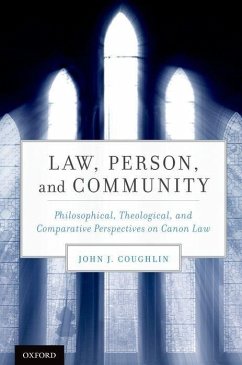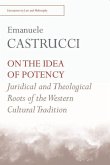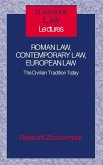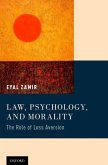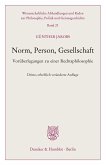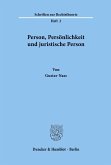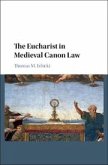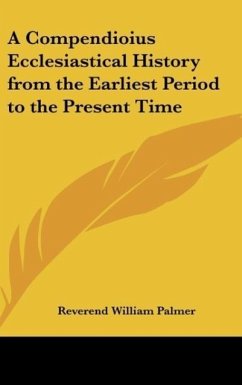John J O F M Coughlin
Law, Person, and Community
Philosophical, Theological, and Comparative Perspectives on Canon Law
John J O F M Coughlin
Law, Person, and Community
Philosophical, Theological, and Comparative Perspectives on Canon Law
- Gebundenes Buch
- Merkliste
- Auf die Merkliste
- Bewerten Bewerten
- Teilen
- Produkt teilen
- Produkterinnerung
- Produkterinnerung
Law, Person, and Community: Philosophical, Theological, and Comparative Perspectives on Canon Law takes up the fundamental question "What is law?" through a comparative study of canon law and secular legal theory.
Andere Kunden interessierten sich auch für
![On the Idea of Potency On the Idea of Potency]() Emanuele CastrucciOn the Idea of Potency149,99 €
Emanuele CastrucciOn the Idea of Potency149,99 €![Roman Law, Contemporary Law, European Law Roman Law, Contemporary Law, European Law]() Reinhard ZimmermannRoman Law, Contemporary Law, European Law163,99 €
Reinhard ZimmermannRoman Law, Contemporary Law, European Law163,99 €![Law, Psychology, and Morality Law, Psychology, and Morality]() Eyal ZamirLaw, Psychology, and Morality171,99 €
Eyal ZamirLaw, Psychology, and Morality171,99 €![Norm, Person, Gesellschaft. Norm, Person, Gesellschaft.]() Günther JakobsNorm, Person, Gesellschaft.29,90 €
Günther JakobsNorm, Person, Gesellschaft.29,90 €![Person, Persönlichkeit und juristische Person. Person, Persönlichkeit und juristische Person.]() Gustav NassPerson, Persönlichkeit und juristische Person.24,90 €
Gustav NassPerson, Persönlichkeit und juristische Person.24,90 €![The Eucharist in Medieval Canon Law The Eucharist in Medieval Canon Law]() Thomas M IzbickiThe Eucharist in Medieval Canon Law126,99 €
Thomas M IzbickiThe Eucharist in Medieval Canon Law126,99 €![A Compendioius Ecclesiastical History from the Earliest Period to the Present Time A Compendioius Ecclesiastical History from the Earliest Period to the Present Time]() Reverend William PalmerA Compendioius Ecclesiastical History from the Earliest Period to the Present Time36,99 €
Reverend William PalmerA Compendioius Ecclesiastical History from the Earliest Period to the Present Time36,99 €-
-
-
Law, Person, and Community: Philosophical, Theological, and Comparative Perspectives on Canon Law takes up the fundamental question "What is law?" through a comparative study of canon law and secular legal theory.
Hinweis: Dieser Artikel kann nur an eine deutsche Lieferadresse ausgeliefert werden.
Hinweis: Dieser Artikel kann nur an eine deutsche Lieferadresse ausgeliefert werden.
Produktdetails
- Produktdetails
- Verlag: Hurst & Co.
- Seitenzahl: 320
- Erscheinungstermin: 16. März 2012
- Englisch
- Abmessung: 239mm x 157mm x 20mm
- Gewicht: 590g
- ISBN-13: 9780199756773
- ISBN-10: 0199756775
- Artikelnr.: 34224735
- Herstellerkennzeichnung
- Libri GmbH
- Europaallee 1
- 36244 Bad Hersfeld
- gpsr@libri.de
- Verlag: Hurst & Co.
- Seitenzahl: 320
- Erscheinungstermin: 16. März 2012
- Englisch
- Abmessung: 239mm x 157mm x 20mm
- Gewicht: 590g
- ISBN-13: 9780199756773
- ISBN-10: 0199756775
- Artikelnr.: 34224735
- Herstellerkennzeichnung
- Libri GmbH
- Europaallee 1
- 36244 Bad Hersfeld
- gpsr@libri.de
John Coughlin is a Professor of Law at the University of Notre Dame. Prof. Coughlin served as professor of canon law of St. Joseph's Seminary in New York from 1994 to 2001. He also served the Archdiocese of New York as a judge in the Appeals Tribunal, as vicar of canonical and legal aspects of health care, and as a member of the boards of several Catholic hospitals and educational institutions. During the summer of 1998, Father Coughlin was a member of the delegation of the Holy See to the United Nations treaty conference that established the International Criminal Court.
* TABLE OF CONTENTS
* Preface and Acknowledgments
* Abbreviations
* Introduction
* I. Knowledge
* II. Law
* III. Person
* IV. Community
* V. An Overview of This Study
* Chapter 1 Canon Law and Anthropology
* I. Anthropology and the Foundation of Law
* II. Anthropological Characteristics
* A. Human Nature
* B. The Body
* C. The Soul
* D. Reason
* E. Affect
* F. Conscience
* G. Free Will
* H. Memory
* I. The Person as Social Being
* J. The End of the Human Person
* III. Conclusion
* Chapter 2 Canon Law and Theology
* I. Canon Law: Ordinance of Faith and Reason
* A. Biblical Anthropology
* B. Historical and Ontological in Canon Law
* C. Anthropology and Revelation
* D. Epistemology and Canon Law
* II. The Theological Justification of Canon Law
* A. Thomas, Luther, and Calvin
* B. Charism and Institution
* C. Communio and Canon Law
* III. Conclusion
* Chapter 3 Canon Law and Natural Law
* I. Human Nature as a Foundation for Law
* A. The New Natural Law Theory
* B. The Function of Natural Law in Canon Law
* C. The Relation Between Natural Law and Theology in Canon Law
* II. Classical and Modern Conceptions of Law and Reason
* A. The Classical Understandings of Law and Reason
* B. Law and Competing Modern Conceptions of Reason
* III. Conclusion
* Chapter 4 Canonical Equity
* I. Historical Development of Canonical Equity
* A. The Medieval Canonists
* B. St. Thomas and Suárez
* C. The Standard of Canonical Equity
* II. Canonical Equity in the Twentieth Century Codes
* A. Expressed Equity
* B. The Equitable Character of the Statute
* C. Unwritten Equity
* III. Historical Consciousness and the Objectivity of Canon Law
* IV. Conclusion
* Chapter 5 Development in Canon Law
* I. The Development of Canon Law and the Development of Doctrine
* A. Newman's Anthropological Analogy
* B. Papal Primacy
* 1. Sacred Scripture and Tradition
* 2. Head and Body
* 3. The CIC-1983
* II. Fundamental Rights in the CIC-1983
* A. The Meaning of Ius
* B. The Doctrine of Human Dignity and Human Rights Law
* C. The Natural Foundation of Human Rights
* D. The Theological Foundation of Human Rights
* III. A Comparison of Development in Canon Law with Positivism's
Secondary Rules
* IV. Conclusion
* Chapter 6 Personalism in Marriage
* I. The Goods of Marriage
* II. The Classical Understanding of Marriage and Secularization
* A. The Medieval Theory of Marriage
* B. The Demise of the Classical Understanding
* III. The Development of the Personalist Perspective in Canon Law
* A. Personalism and Vatican II
* B. Jurisprudence of the Roman Rota
* IV. Conclusion
* Chapter 7 Canon Law and the Secular State
* I. Traditional and Modern Views of Church State Relations
* II. Anthropological Assumptions and the First Amendment
* A. Theological Anthropology
* B. Rationalist Anthropology
* III. The Catholic Schools and the First Amendment
* A. Schools and the One Best System
* B. Strict-Separationism
* C. Problems with Public Policy by Judicial Review
* IV. Conclusion
* Chapter 8 The Impact of Neutral Rules on Hierarchical Churches
* I. The Supreme Court's Neutral Rules Approach
* A. Judicial Deference to Hierarchical Churches
* B. Neutral Rules
* C. Problems with Neutrality
* II. Questions about the Impact of Neutral Rules on Hierarchical
Churches
* A. The Secular Court's Competency Over Church Doctrine and Law
* B. Congregational v. Hierarchical Church Government
* C. Tort Liability for Essentially Religious Decisions
* D. Excessive Entanglement and Judicial Review
* E. Generally Applicable Law and Religious Freedom
* III. Conclusion
* Conclusion
* I. Law
* II. Person
* III. Community
* Preface and Acknowledgments
* Abbreviations
* Introduction
* I. Knowledge
* II. Law
* III. Person
* IV. Community
* V. An Overview of This Study
* Chapter 1 Canon Law and Anthropology
* I. Anthropology and the Foundation of Law
* II. Anthropological Characteristics
* A. Human Nature
* B. The Body
* C. The Soul
* D. Reason
* E. Affect
* F. Conscience
* G. Free Will
* H. Memory
* I. The Person as Social Being
* J. The End of the Human Person
* III. Conclusion
* Chapter 2 Canon Law and Theology
* I. Canon Law: Ordinance of Faith and Reason
* A. Biblical Anthropology
* B. Historical and Ontological in Canon Law
* C. Anthropology and Revelation
* D. Epistemology and Canon Law
* II. The Theological Justification of Canon Law
* A. Thomas, Luther, and Calvin
* B. Charism and Institution
* C. Communio and Canon Law
* III. Conclusion
* Chapter 3 Canon Law and Natural Law
* I. Human Nature as a Foundation for Law
* A. The New Natural Law Theory
* B. The Function of Natural Law in Canon Law
* C. The Relation Between Natural Law and Theology in Canon Law
* II. Classical and Modern Conceptions of Law and Reason
* A. The Classical Understandings of Law and Reason
* B. Law and Competing Modern Conceptions of Reason
* III. Conclusion
* Chapter 4 Canonical Equity
* I. Historical Development of Canonical Equity
* A. The Medieval Canonists
* B. St. Thomas and Suárez
* C. The Standard of Canonical Equity
* II. Canonical Equity in the Twentieth Century Codes
* A. Expressed Equity
* B. The Equitable Character of the Statute
* C. Unwritten Equity
* III. Historical Consciousness and the Objectivity of Canon Law
* IV. Conclusion
* Chapter 5 Development in Canon Law
* I. The Development of Canon Law and the Development of Doctrine
* A. Newman's Anthropological Analogy
* B. Papal Primacy
* 1. Sacred Scripture and Tradition
* 2. Head and Body
* 3. The CIC-1983
* II. Fundamental Rights in the CIC-1983
* A. The Meaning of Ius
* B. The Doctrine of Human Dignity and Human Rights Law
* C. The Natural Foundation of Human Rights
* D. The Theological Foundation of Human Rights
* III. A Comparison of Development in Canon Law with Positivism's
Secondary Rules
* IV. Conclusion
* Chapter 6 Personalism in Marriage
* I. The Goods of Marriage
* II. The Classical Understanding of Marriage and Secularization
* A. The Medieval Theory of Marriage
* B. The Demise of the Classical Understanding
* III. The Development of the Personalist Perspective in Canon Law
* A. Personalism and Vatican II
* B. Jurisprudence of the Roman Rota
* IV. Conclusion
* Chapter 7 Canon Law and the Secular State
* I. Traditional and Modern Views of Church State Relations
* II. Anthropological Assumptions and the First Amendment
* A. Theological Anthropology
* B. Rationalist Anthropology
* III. The Catholic Schools and the First Amendment
* A. Schools and the One Best System
* B. Strict-Separationism
* C. Problems with Public Policy by Judicial Review
* IV. Conclusion
* Chapter 8 The Impact of Neutral Rules on Hierarchical Churches
* I. The Supreme Court's Neutral Rules Approach
* A. Judicial Deference to Hierarchical Churches
* B. Neutral Rules
* C. Problems with Neutrality
* II. Questions about the Impact of Neutral Rules on Hierarchical
Churches
* A. The Secular Court's Competency Over Church Doctrine and Law
* B. Congregational v. Hierarchical Church Government
* C. Tort Liability for Essentially Religious Decisions
* D. Excessive Entanglement and Judicial Review
* E. Generally Applicable Law and Religious Freedom
* III. Conclusion
* Conclusion
* I. Law
* II. Person
* III. Community
* TABLE OF CONTENTS
* Preface and Acknowledgments
* Abbreviations
* Introduction
* I. Knowledge
* II. Law
* III. Person
* IV. Community
* V. An Overview of This Study
* Chapter 1 Canon Law and Anthropology
* I. Anthropology and the Foundation of Law
* II. Anthropological Characteristics
* A. Human Nature
* B. The Body
* C. The Soul
* D. Reason
* E. Affect
* F. Conscience
* G. Free Will
* H. Memory
* I. The Person as Social Being
* J. The End of the Human Person
* III. Conclusion
* Chapter 2 Canon Law and Theology
* I. Canon Law: Ordinance of Faith and Reason
* A. Biblical Anthropology
* B. Historical and Ontological in Canon Law
* C. Anthropology and Revelation
* D. Epistemology and Canon Law
* II. The Theological Justification of Canon Law
* A. Thomas, Luther, and Calvin
* B. Charism and Institution
* C. Communio and Canon Law
* III. Conclusion
* Chapter 3 Canon Law and Natural Law
* I. Human Nature as a Foundation for Law
* A. The New Natural Law Theory
* B. The Function of Natural Law in Canon Law
* C. The Relation Between Natural Law and Theology in Canon Law
* II. Classical and Modern Conceptions of Law and Reason
* A. The Classical Understandings of Law and Reason
* B. Law and Competing Modern Conceptions of Reason
* III. Conclusion
* Chapter 4 Canonical Equity
* I. Historical Development of Canonical Equity
* A. The Medieval Canonists
* B. St. Thomas and Suárez
* C. The Standard of Canonical Equity
* II. Canonical Equity in the Twentieth Century Codes
* A. Expressed Equity
* B. The Equitable Character of the Statute
* C. Unwritten Equity
* III. Historical Consciousness and the Objectivity of Canon Law
* IV. Conclusion
* Chapter 5 Development in Canon Law
* I. The Development of Canon Law and the Development of Doctrine
* A. Newman's Anthropological Analogy
* B. Papal Primacy
* 1. Sacred Scripture and Tradition
* 2. Head and Body
* 3. The CIC-1983
* II. Fundamental Rights in the CIC-1983
* A. The Meaning of Ius
* B. The Doctrine of Human Dignity and Human Rights Law
* C. The Natural Foundation of Human Rights
* D. The Theological Foundation of Human Rights
* III. A Comparison of Development in Canon Law with Positivism's
Secondary Rules
* IV. Conclusion
* Chapter 6 Personalism in Marriage
* I. The Goods of Marriage
* II. The Classical Understanding of Marriage and Secularization
* A. The Medieval Theory of Marriage
* B. The Demise of the Classical Understanding
* III. The Development of the Personalist Perspective in Canon Law
* A. Personalism and Vatican II
* B. Jurisprudence of the Roman Rota
* IV. Conclusion
* Chapter 7 Canon Law and the Secular State
* I. Traditional and Modern Views of Church State Relations
* II. Anthropological Assumptions and the First Amendment
* A. Theological Anthropology
* B. Rationalist Anthropology
* III. The Catholic Schools and the First Amendment
* A. Schools and the One Best System
* B. Strict-Separationism
* C. Problems with Public Policy by Judicial Review
* IV. Conclusion
* Chapter 8 The Impact of Neutral Rules on Hierarchical Churches
* I. The Supreme Court's Neutral Rules Approach
* A. Judicial Deference to Hierarchical Churches
* B. Neutral Rules
* C. Problems with Neutrality
* II. Questions about the Impact of Neutral Rules on Hierarchical
Churches
* A. The Secular Court's Competency Over Church Doctrine and Law
* B. Congregational v. Hierarchical Church Government
* C. Tort Liability for Essentially Religious Decisions
* D. Excessive Entanglement and Judicial Review
* E. Generally Applicable Law and Religious Freedom
* III. Conclusion
* Conclusion
* I. Law
* II. Person
* III. Community
* Preface and Acknowledgments
* Abbreviations
* Introduction
* I. Knowledge
* II. Law
* III. Person
* IV. Community
* V. An Overview of This Study
* Chapter 1 Canon Law and Anthropology
* I. Anthropology and the Foundation of Law
* II. Anthropological Characteristics
* A. Human Nature
* B. The Body
* C. The Soul
* D. Reason
* E. Affect
* F. Conscience
* G. Free Will
* H. Memory
* I. The Person as Social Being
* J. The End of the Human Person
* III. Conclusion
* Chapter 2 Canon Law and Theology
* I. Canon Law: Ordinance of Faith and Reason
* A. Biblical Anthropology
* B. Historical and Ontological in Canon Law
* C. Anthropology and Revelation
* D. Epistemology and Canon Law
* II. The Theological Justification of Canon Law
* A. Thomas, Luther, and Calvin
* B. Charism and Institution
* C. Communio and Canon Law
* III. Conclusion
* Chapter 3 Canon Law and Natural Law
* I. Human Nature as a Foundation for Law
* A. The New Natural Law Theory
* B. The Function of Natural Law in Canon Law
* C. The Relation Between Natural Law and Theology in Canon Law
* II. Classical and Modern Conceptions of Law and Reason
* A. The Classical Understandings of Law and Reason
* B. Law and Competing Modern Conceptions of Reason
* III. Conclusion
* Chapter 4 Canonical Equity
* I. Historical Development of Canonical Equity
* A. The Medieval Canonists
* B. St. Thomas and Suárez
* C. The Standard of Canonical Equity
* II. Canonical Equity in the Twentieth Century Codes
* A. Expressed Equity
* B. The Equitable Character of the Statute
* C. Unwritten Equity
* III. Historical Consciousness and the Objectivity of Canon Law
* IV. Conclusion
* Chapter 5 Development in Canon Law
* I. The Development of Canon Law and the Development of Doctrine
* A. Newman's Anthropological Analogy
* B. Papal Primacy
* 1. Sacred Scripture and Tradition
* 2. Head and Body
* 3. The CIC-1983
* II. Fundamental Rights in the CIC-1983
* A. The Meaning of Ius
* B. The Doctrine of Human Dignity and Human Rights Law
* C. The Natural Foundation of Human Rights
* D. The Theological Foundation of Human Rights
* III. A Comparison of Development in Canon Law with Positivism's
Secondary Rules
* IV. Conclusion
* Chapter 6 Personalism in Marriage
* I. The Goods of Marriage
* II. The Classical Understanding of Marriage and Secularization
* A. The Medieval Theory of Marriage
* B. The Demise of the Classical Understanding
* III. The Development of the Personalist Perspective in Canon Law
* A. Personalism and Vatican II
* B. Jurisprudence of the Roman Rota
* IV. Conclusion
* Chapter 7 Canon Law and the Secular State
* I. Traditional and Modern Views of Church State Relations
* II. Anthropological Assumptions and the First Amendment
* A. Theological Anthropology
* B. Rationalist Anthropology
* III. The Catholic Schools and the First Amendment
* A. Schools and the One Best System
* B. Strict-Separationism
* C. Problems with Public Policy by Judicial Review
* IV. Conclusion
* Chapter 8 The Impact of Neutral Rules on Hierarchical Churches
* I. The Supreme Court's Neutral Rules Approach
* A. Judicial Deference to Hierarchical Churches
* B. Neutral Rules
* C. Problems with Neutrality
* II. Questions about the Impact of Neutral Rules on Hierarchical
Churches
* A. The Secular Court's Competency Over Church Doctrine and Law
* B. Congregational v. Hierarchical Church Government
* C. Tort Liability for Essentially Religious Decisions
* D. Excessive Entanglement and Judicial Review
* E. Generally Applicable Law and Religious Freedom
* III. Conclusion
* Conclusion
* I. Law
* II. Person
* III. Community

